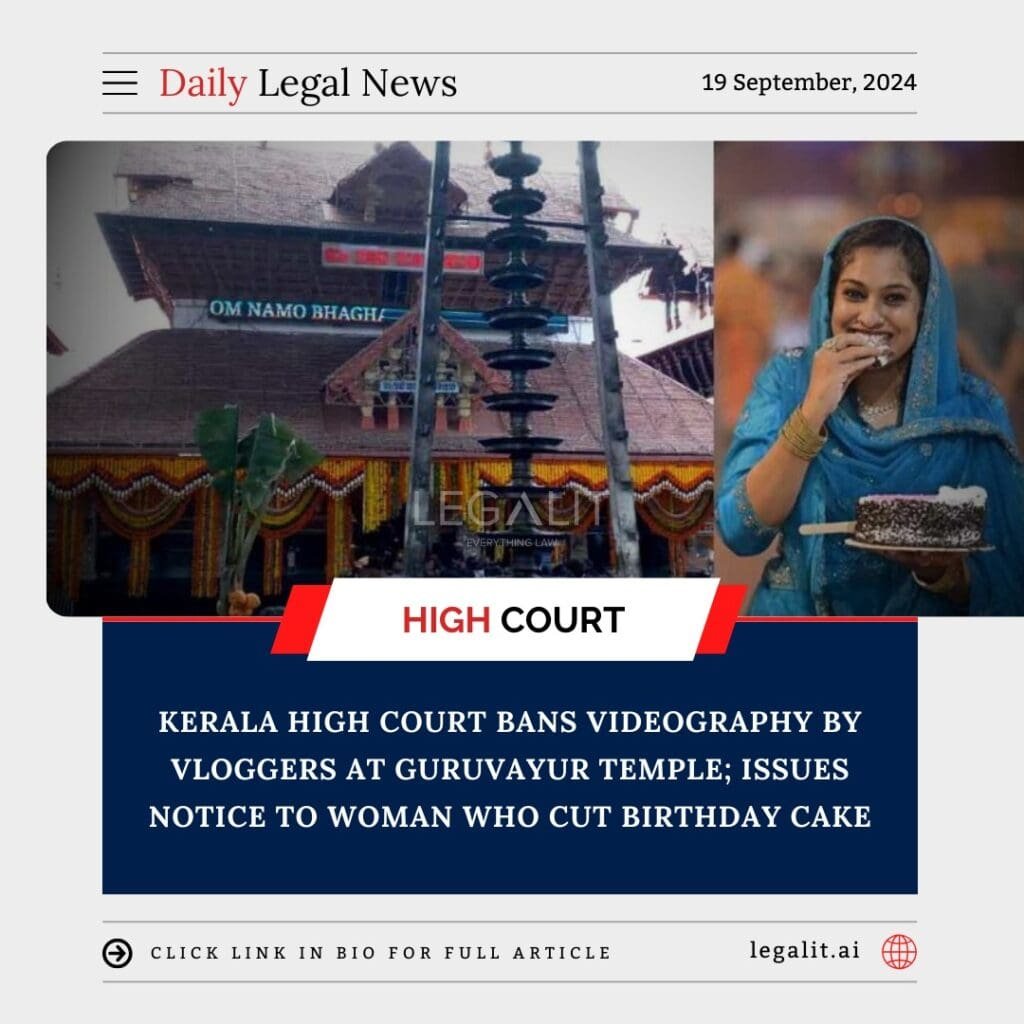
In a move aimed at preserving the sanctity of religious rituals, the Kerala High Court has banned videography by vloggers inside the premises of the famous Guruvayur Temple. The court also issued a notice to a woman who stirred controversy by cutting a birthday cake within the temple grounds, an act seen by many as disrespectful to the temple’s religious norms.
The Case of Vlogging in the Temple
The decision comes after concerns were raised regarding vloggers recording and sharing videos from within the temple, particularly during religious rituals and personal moments of devotees. The *Guruvayur Temple, dedicated to *Lord Krishna, is one of the most sacred temples in Kerala, and its customs and traditions are strictly upheld.
Temple authorities had received multiple complaints that some vloggers were intruding on the privacy of devotees and disrupting the solemn atmosphere by filming inside the temple premises. These vlogs, often uploaded to social media platforms, were seen as violating the sanctity of the religious space and disrespecting the traditional values of the temple.
In light of these complaints, the Kerala High Court intervened and imposed a ban on all kinds of videography by vloggers inside the temple. The court stressed that the Guruvayur Devaswom (the temple management) has the responsibility to ensure that the temple’s spiritual environment is maintained without disruption. The ruling reinforces the temple’s existing policies, which already restrict the use of cameras and mobile phones in certain areas of the temple complex.
The Birthday Cake Controversy
The court’s action was also prompted by a separate incident where a woman was seen cutting a birthday cake inside the temple premises. The video of the event, which went viral on social media, sparked outrage among devotees and the temple administration, who viewed it as a violation of the temple’s decorum.
According to temple norms, the Guruvayur Temple strictly prohibits any non-religious activities within its premises, and birthday celebrations or the consumption of food such as cake is considered inappropriate in a sacred space. The cutting of the cake was seen as an act of disrespect to the temple’s traditions.
In response to the controversy, the Kerala High Court issued a notice to the woman involved, seeking her explanation for the incident. The court indicated that such actions could set a dangerous precedent, undermining the sanctity of the temple and encouraging further breaches of protocol. The temple administration has also called for stricter enforcement of rules to prevent such incidents in the future.
Court’s Rationale and Impact
The Kerala High Court highlighted two main concerns in its ruling:
- Protection of Religious Sanctity: The court emphasized that the primary purpose of the Guruvayur Temple is to provide a peaceful and sacred space for worshippers to engage in religious rituals. The growing trend of vlogging and social media activity inside the temple was seen as detracting from this purpose, creating an environment where worshippers’ privacy and the sanctity of rituals were compromised.
- Regulation of Non-Religious Activities: The court made it clear that actions such as birthday celebrations or other non-religious events have no place in the temple, and such behavior would not be tolerated. The cutting of the birthday cake was deemed an act that violated the long-established customs of the temple, and the court’s notice serves as a warning to others who might attempt similar activities.
Broader Implications
The Kerala High Court’s ruling is likely to set a precedent for other temples and religious institutions across the state and the country. With the growing popularity of vlogging and social media influencers capturing their experiences in sacred spaces, the court’s decision could lead to more stringent regulations in religious sites to protect the sanctity of rituals and traditions.
Temple management boards might also be encouraged to implement stricter rules around videography and non-religious activities within temple premises, ensuring that such spaces are respected for their intended purpose—worship and spiritual reflection.
Conclusion
The Kerala High Court’s ban on vlogging and its notice to the woman involved in the birthday cake incident at the Guruvayur Temple underscores the importance of maintaining respect for religious customs and traditions in sacred spaces. The ruling aims to preserve the temple’s sanctity while sending a strong message that non-religious activities or disruptions will not be tolerated within its premises. This case highlights the ongoing challenge of balancing modern practices, such as social media vlogging, with the need to uphold the spiritual and cultural integrity of religious sites.